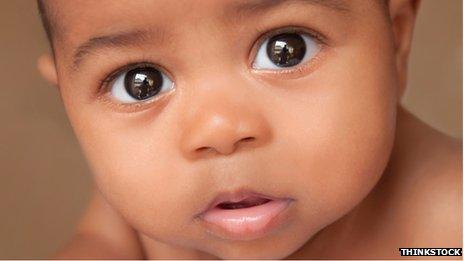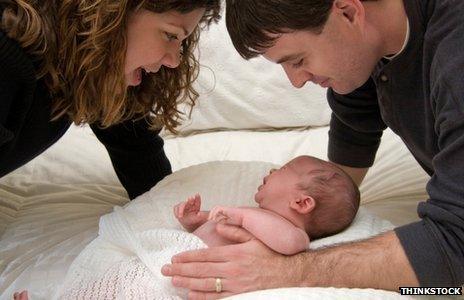New parents shun state relationship help
- Published
- comments

A government programme to promote family stability by helping new parents through the stresses and strains of having children has been scrapped because virtually no-one turned up.
Relationship support was offered in five trial areas across England but, in the words of an evaluation technical report, external published today, "after the first six months of the trials less than ten couples had participated in any of the programmes".
We might forgive the Department for Education for its grammatical howler (technically, it should be fewer than ten couples) but the programme has clearly been a bit of a horlicks. As the report puts it "although take-up was forecast to be quite slow this was much lower than expected and it was decided to end the trials in June 2013".
A clue to the failure is that relationship support "was not aimed at people with relationship problems". Instead, parents were contacted if their oldest child was under two or if their first child was due within three months. They could pick an hour-long face-to-face session or an online workshop to be completed at their own pace.

We're a bit busy at the moment
One can only imagine counsellors poised to offer expert guidance on how to keep relationships healthy, the kettle boiled, a plate of digestives on hand. Days, weeks, then months drift by with virtually no new parents taking up the free offer of government-funded advice. Or even free biscuits.
After six months of no shows, ministers threw in the towel. I am waiting for the department to tell me how much it all cost. As soon as I hear, I will insert it here.
Five thousand couples were also asked to complete a questionnaire on what they thought about relationship guidance. Again, the research team was disappointed by the lack of enthusiasm. Only 23% of couples returned the forms, "a lower level of response than had been hoped for," as the evaluation puts it.
An obvious mistake was imagining that a couple with a brand new baby, surviving on minimal sleep, and desperately trying to get the hang of nappies, would want to give up time to participate in some state research project.
There is some evidence that new parent support can be useful, but the survey suggests many don't see the point: "More agreed than disagreed that there's not much point in going on a course about relationships if your own relationship is fine".
There was general agreement in the survey that advice can be beneficial and should be available. But "over half of respondents thought that they would not have time to spend on their relationship as new parents and that parents are more likely to focus on their relationships when their children are a bit older."
These, remember, are the views of only the 23% of selected parents who were enthusiastic enough to complete the survey.
The trials were begun after ministers were convinced that interventions in the US "report statistically significant impacts on couple relationship quality". Two programmes are cited in the evaluation - Family Foundations and Couple Care for Parents.
The first, Family Foundations, is already available to couples in Britain. The DfE has devoted a page of its website, external to the programme. But the evidence behind it is only described as "promising" and the DfE says "there is currently no information on the programme's cost-effectiveness".
The second, Couple Care for Parents, is described by researchers, external at Penn State University as having "mixed results" and with an evidence base that is "unclear".
Despite the incomplete and rather lukewarm evaluation of the two programmes, the DfE decided that UK taxpayers money should be spent developing a model here. "In light of the evidence above and the positive impacts seen overseas, it was deemed appropriate to trial early intervention relationship support to new parents in the British setting," today's evaluation states.
One wonders what drove ministers to press ahead with these trials. Today's report simply says it was "in tune with the Government's commitment to promote family stability".
This particular promotion, though, has now been withdrawn.
UPDATE 15:10 4 DECEMBER
I mentioned above that I was waiting for the DfE to tell me how much the failed scheme cost. I have now been told by them that this information is "not in the public domain".
- Published18 October 2011